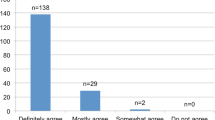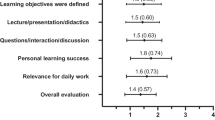Abstract
In response to the complexity of medical care in oncology, 2 years ago, we designed a new teaching method (SPOC, Small Private Online Course) to improve cancer treatment and its management by emphasizing the community-hospital interface. The educational objective of this study was to evaluate after 1 year if the interest for this teaching remained constant over the long term to meet both educational and financial requirements. We designed a questionnaire including 18 questions grouped in 3 main parts describing the profile of the participants, his/her own experience, and the current utilization of the SPOC. Of 1574 participants of the 2 first sessions, 182 (11.5%) completed the questionnaire after 1 year. The majority of respondents were between the ages of 31 and 60 and belonged to a paramedical group (47.81%). After 1 year, 84.6% participants were satisfied or very satisfied with the content of the SPOC, 83.6% would recommended it, and 67% would be interested in using an updated SPOC again. Only 4.9% kept some contacts with other participants and 4.9% with teachers. 31.3% considered that the SPOC had a medium impact on their professional activity, 33.5% a lot, and 2.7% completely whereas 24.7% considered that it had little impact. The evaluation at 1 year showed that this digital learning method had a global positive impact on the professional practice of the participants. This study highlighted the empowerment of participants after this kind of teaching, but the network between participants was not enhanced.

Similar content being viewed by others
References
Cave J (2016) Oncology and medical education-past, present and future. Ecancermedicalscience 10:ed54
Payne S, Burke D, Mansi J, Jones A, Norton A, Joffe J, Cunningham D, McVie G, Agarwal R (2013) Discordance between cancer prevalence and training: a need for an increase in oncology education. Clin Med (Lond) 13(1):50–56
Gardair C, Bousquet G, Lehmann-Che J, de Bazelaire C, de Cremoux P, Tran Van Nhieu J et al (2016) Les coulisses d’un Massive Open Online Course (MOOC) sur le diagnostic des cancers. Ann Pathol 36(5):305–311
Multon S, Pesesse L, Weatherspoon A, Florquin S, Van de Poel J-F, Martin P et al (2018) A Massive Open Oneline Course (MOOC) on pratical histology: a goal, a tool, a large public! Return on a first experience. Ann Pathol 38(2):76–84
Vaysse C, Chantalat E, Beyne-Rauzy O, Morineau L, Despas F, Bachaud J-M, Caunes N, Poublanc M, Serrano E, Bugat R, Rougé Bugat ME, Fize AL (2018) The impact of a Small Private Online Course as a new approach to teaching oncology: development and evaluation. JMIR Med Educ 4(1):e6
Jordan K (2014) Initial trends in enrolment and completion of massive open online courses. Int Rev Res Open Dist Learn [Internet]. [cited 2017 Jul 16];15(1). Available from: http://www.irrodl.org/index.php/irrodl/article/view/1651
Wewer Albrechtsen NJ, Poulsen KW, Svensson LØ, Jensen L, Holst JJ, Torekov SS (2017) Health care professionals from developing countries report educational benefits after an online diabetes course. BMC Med Educ 17(1):97
Rouge-Bugat ME, Lassoued D, Bacrie J, Boussier N, Delord J-P, Oustric S, Bauvin E, Lapeyre-Mestre M, Bertucci F, Grosclaude P (2015) Guideline sheets on the side effects of anticancer drugs are useful for general practitioners. Support Care Cancer 23(12):3473–3480
Rougé Bugat ME, Dufossé V, Paul C, Oustric S, Meyer N (2016) Communicating information to the general practitioner: the example of vemurafenib for metastatic melanoma. J Eur Acad Dermatol Venereol 30(12):e192–e194
Leonard M (2004) The human factor: the critical importance of effective teamwork and communication in providing safe care. Qual Saf Health Care 13(suppl_1):i85–i90
Hornstein HA, Law HFE (Reviewing Editor) (2017) Student evaluations of teaching are an inadequate assessment tool for evaluating faculty performance. Cogent Education 4:1. https://doi.org/10.1080/2331186X.2017.1304016
Stark PB, Freishtat R (2014) An evaluation of course evaluations. ScienceOpen Research. https://doi.org/10.14293/s2199-1006.1.sor-edu.aofrqa.v1.
Meinert E, Alturkistani A, Brindley D, Carter A, Wells G, Car J (2018) Protocol for a mixed-methods evaluation of a massive open online course on real world evidence. BMJ Open 8(8):e025188
Dunham-Taylor J, Lynn CW, Moore P, McDaniel S, Walker JK (2008) What goes around comes around: improving faculty retention through more effective mentoring. J Prof Nurs 24(6):337–346
Barais M, Laporte C, Schuers M, Saint-Lary O, Frappé P, Dibao-Dina C, Darmon D, Bouchez T, Gelly J (2018) Cross-sectional multicentre study on the cohort of all the French junior lecturers in general practice. Eur J Gen Pract 24(1):99–105
Houston D, Meyer LH, Paewai S (2016) Academic staff workloads and job satisfaction: expectations and values in academe. J High Educ Policy Manag 28(1):17–30. https://doi.org/10.1080/13600800500283734
Fox L, Onders R, Hermansen-Kobulnicky CJ, Nguyen T-N, Myran L, Linn B, Hornecker J (2018) Teaching interprofessional teamwork skills to health professional students: a scoping review. J Interprof Care 32(2):127–135
El-Awaisi A, Joseph S, El Hajj MS, Diack L (2018) A comprehensive systematic review of pharmacy perspectives on interprofessional education and collaborative practice. Res Soc Adm Pharm 14(10):863–882
Acknowledgments
We acknowledge the professionals who participated in this SPOC: Emmanuelle Arfé, Roland Bugat, Eric Chetaille, Martine Delannes, Frédéric Despiau, Corinne Grino-Hannotel, Dany Labant, Jean-Jacques Morfoisse, Veronique Pelagatti-Charrade, Fabrice Pereira, Elodie Perez, Bruno Rokoszak, and Virgile Samson.
This SPOC was supported by the education department of the Cancer Pharmacology of Toulouse-Oncopole and Region (CAPTOR (ANR-11-PHUC-001: CAPTOR)) program, a large research project devoted to innovate, evaluate, and market anticancer medications, and for all training courses linked to these domains. The project CAPTOR was financed by the French National Research Agency (“Investissements d’Avenir”) and has been delivered to Toulouse III – Paul Sabatier University and to all its partners: the Toulouse Cancer Research Center (CRCT), the University Hospital of Toulouse (CHU de Toulouse), and the Institute Claudius Regaud (ICR). Thinkovery-Smart Digital Learning Agency, Nantes, France, specializing in MOOC/SPOC, helped with our project videos and the quizzes and tests.
Author information
Authors and Affiliations
Corresponding author
Ethics declarations
Competing Interests
The authors declare that they have no competing interests.
Additional information
Publisher’s Note
Springer Nature remains neutral with regard to jurisdictional claims in published maps and institutional affiliations.
Rights and permissions
About this article
Cite this article
Vaysse, C., Fize, AL., Despas, F. et al. Small Private Online Course in Teaching Oncology—Feedback After 1 Year: What Lessons?. J Canc Educ 36, 65–71 (2021). https://doi.org/10.1007/s13187-019-01598-z
Published:
Issue Date:
DOI: https://doi.org/10.1007/s13187-019-01598-z




